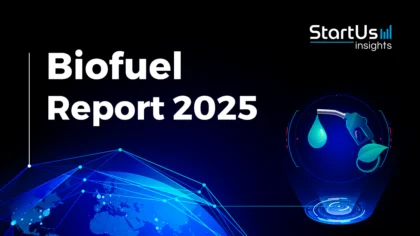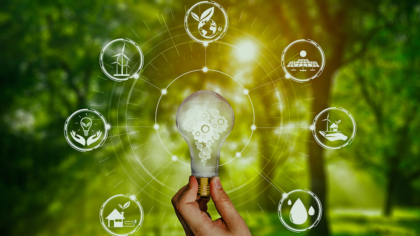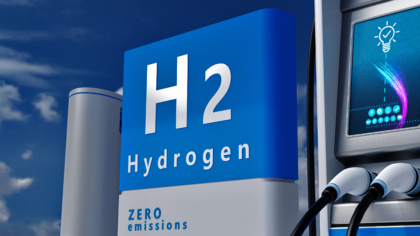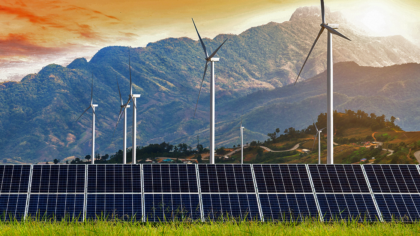The renewable energy industry experienced advancement in recent years due to key technologies such as solar photovoltaic (PV) systems, wind turbines, energy storage systems, and smart grid technologies. Solar PV systems became more efficient and affordable with advances in materials and manufacturing processes. Wind turbines also see improvements in efficiency with AI-powered self-training turbines and larger turbines that generate more power at lower costs. Together, these emerging technologies grow the renewable energy industry and reduce reliance on fossil fuels for electricity generation. Let’s dive into a list of 20 renewable energy startups that develop innovative solutions and enable smoother energy transition.
This article was last updated in July 2024.
20 Renewable Energy Startups to Watch (2025)
- Octoteq – Offshore Renewable Energy Platforms
- BaroMar – Underwater Compressed Air Energy Storage
- RIFT – Clean Iron Fuel
- TidalWatt – Submerged Power Plants
- Sol Clarity – Automated Solar Panel Cleaning
- Solarflux – Solar Parabolic Dish Concentrator
- GEVI – Self-training Wind Turbines
- Qnetic – Flywheel Energy Storage
- Endua – Hydrogen-based Energy Storage
- BIOENA – Sustainable Bioenergy
- Windscape AI – Precise Wind Nowcasts
- HydGene Renewables – On-site Green Hydrogen Production
- Enoda – Power Grid Control
- Myriad Wind Energy Systems – Multi-Rotor Wind Turbine
- Prairie Clean Energy – Biomass Fuel
- Easy Hydro – Modular Hydropower Solutions
- NovusEarth – Closed-loop Geothermal System
- Gazelle Wind Power – Floating Wind Turbine Platform
- LAVO – Long Duration Energy Storage (LDES)
- Wave To Energy – Floating Wave Energy Converter (WEC)
Global Startup Heat Map highlights 20 Renewable Energy Startups to Watch
Through the Big Data & Artificial Intelligence (AI)-powered StartUs Insights Discovery Platform, covering over 4.7M+ startups & scaleups globally, we identified 4777 renewable energy startups. The Global Startup Heat Map below highlights the 20 renewable energy startups you should watch in 2025 as well as the geo-distribution of all renewable energy startups & scaleups we analyzed for this research.
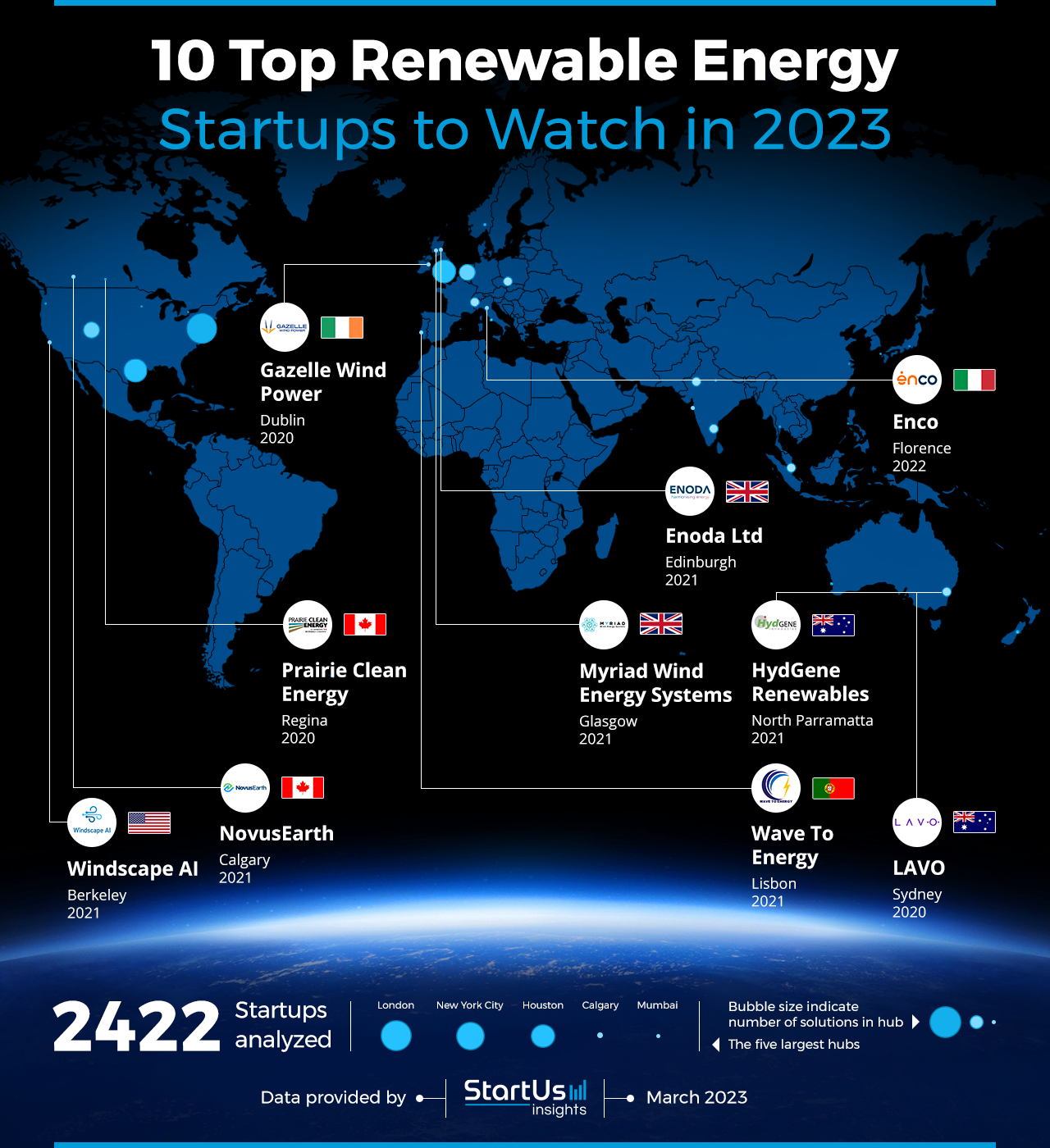
Based on the heat map, we see high startup activity in the USA and Europe, followed by India. These renewable energy startups work on solutions ranging from clean iron fuel and submerged power plants to self-training wind turbines and hydrogen-based energy storage.
As the world’s largest resource for data on emerging companies, the SaaS platform enables you to identify relevant technologies and industry trends quickly & exhaustively. Based on the data from the platform, the Top 20 Energy Startup Hubs are in London, New York, Houston, Calgary, and Mumbai. The 20 hand-picked startups highlighted in this report are chosen from all over the world and develop solutions for self-training wind turbines, flywheel energy storage, submerged power plants, clean iron fuel, and much more.
Discover 20 Renewable Energy Startups to Watch (2025)
Octoteq makes Offshore Renewable Energy Platforms

Octoteq is a startup from the Czech Republic that develops offshore renewable energy platforms that integrate solar, wind, and wave power. These platforms, semi-submerged and floating, combine three renewable energy sources for high power density and adaptability to various weather conditions. Each platform generates up to 68 MW, utilizing linear generators with magnetic bearings for wave energy conversion and glass-glass photovoltaic systems for solar energy.
The platforms also feature vertical-axis wind turbines, efficient in turbulent winds, enhancing power generation per square meter. Octoteq addresses the intermittent nature of renewable energy through short-term and long-term storage solutions, including kinetic energy recovery and green hydrogen storage. The company employs edge AI and open-source approaches for an intelligent power grid, ensuring seamless communication between power sources, storage systems, and client technology.
BaroMar enables Underwater Compressed Air Energy Storage

Polish startup BaroMar offers underwater compressed air energy storage, overcoming the limitations of traditional compressed air energy storage (CAES) systems. It stores compressed air in rigid structures anchored to the seabed. When electricity production is in surplus, a compressor increases ambient air pressure to the required level. The pressurized is then piped into large and rigid interconnected underwater reservoirs pushing out the water within them.
When the demand for electricity rises and the stored energy is required, the compressed air is released back through the pipe, while water is driven back into the reservoirs. The air flows through a thermal recovery system into a turbo expander that drives the generator that supplies the grid. Further, the solution integrates with various thermodynamic cycles, including diabatic, adiabatic, and isothermal processes, thus making it scalable.
RIFT provides Clean Iron Fuel

Based out of the Netherlands, RIFT is a startup that enables energy-intensive industries to leverage clean energy. The company’s Iron Fuel Technology offers cost-effective energy systems for renewable heat supply. The technology involves rusting and unrusting iron, where rusting produces high-temperature energy for steam or hot water, and unrusting occurs through a chemical reaction with hydrogen.
This process allows for sustainable hydrogen to be storable, transportable, and suitable for zero-carbon high-temperature heat delivery, making it applicable to various energy transport and storage concepts. This technology finds application in district heating, industrial processes, and electricity plants. Additionally, RIFT supports peak-load electricity generation for grid stability with intermittent renewable electricity supply.
TidalWatt develops Submerged Power Plants

Brazilian startup TidalWatt makes an underwater turbine, Current Energy Collection Unit (UCEC), to utilize tidal energy. UCEC is a submerged power plant that efficiently utilizes the constant flow of ocean currents. Traditional turbines cannot stop water from flowing through the free spans between the propellers in the sweeping area, which is where the volume of water flows fastest (venturi effect).
UCEC overcomes this issue as it occupies the entire relevant area of the water flow. This feature conveniently combined with the pressure levels of the submerged environment and its set of propellers invokes the energy associated with the huge net mass. Thus, TidalWatt enables the placements of ecologically safe power plants in previously neglected regions, leveraging tidal energy effectively.
Sol Clarity enables Automated Solar Panel Cleaning

USA-based startup Sol Clarity automatically removes dust and improves the energy yield/output power of solar panels without the need to wash the panels with water. This automated solar panel cleaning is made possible with the startup’s Electrodynamic Screen (EDS) technology.
The EDS consists of rows of interdigitated, parallel electrodes that charge dust particles with static electricity and sweep them off the surface by a generated traveling electric wave. This is done all while drawing negligible power from the solar power itself. This way, Sol Clarity avoids wasting potable water resources, reduces the need for human labor to clean solar panels, and allows solar plants to operate at maximum efficiency.
Solarflux makes Solar Parabolic Dish Concentrator

US-based startup Solarflux develops advanced solar thermal power solutions. Its FOCUS, a solar parabolic dish concentrator, uses dual-axis tracking to maximize solar energy capture year-round. Its optical design leverages the full spectrum of solar irradiance and converts it into thermal energy with minimal loss. This technology avoids conversion inefficiencies and achieves higher thermal energy conversion rates than competing systems.
FOCUS autonomously operates with minimal maintenance and provides clean, cost-effective thermal energy. Applications include industrial process heat, space heating and cooling, water desalination, and remote power generation.
GEVI designs Self-training Wind Turbines

GEVI is an Italian startup that makes vertical-axis wind turbines with active blade pitch control. These turbines utilize flexible hardware and AI to adapt to varying wind conditions and installation sites. The AI analyzes real-time wind data, maximizing energy production and extending operational life. The turbines first evaluate the optimal starting speed and strategy (starting phase).
It then maximizes the power extracted from the wind (cruise phase). Following that, it reduces periodic oscillations and loads (load management phase). In the final cut-off stage, the blades act as vane, self-aligning with the wind. Thus, the adaptability of GEVI’s wind turbines allows them to extract maximum energy from any wind condition, significantly enhancing efficiency. Moreover, the turbines are sustainable as they are 3D printed using recyclable materials.
Qnetic enhances Flywheel Energy Storage

Qnetic builds a flywheel energy storage system (FESS) that supports the daily supply and demand cycles of a grid predominantly powered by renewable sources. These flywheels can be connected to form grid-scale arrays with unlimited capacity and power, charging during the day from solar energy and at night from wind, thus enabling a clean grid necessary for achieving net zero goals.
Qnetic’s installs its FESS below ground for intrinsic safety and minimal visual impact. Its rotor is made from lightweight, high-strength fibers, allowing for higher energy storage efficiency. Additionally, Qnetic’s levitation bearings ensure zero contact, friction, and wear, with a self-discharge period of two weeks.
Endua offers Hydrogen-based Energy Storage

Endua is an Australian startup that provides long-duration energy storage using hydrogen to provide cost-effective, self-sustainable energy for various industries. The startup’s modular energy storage solution, Endua Power Bank, integrates hydrogen and power technologies for rapid field deployment, reducing project timescales significantly.
This technology is adaptable for a wide range of applications, offering scalable and versatile energy storage. Thus, Endua’s technology supports industries in achieving sustainable, clean energy, marking a significant step towards decarbonization.
BIOENA simplifies Sustainable Bioenergy

BIOENA is a startup from Columbia that produces sustainable wood pellets and chips from non-commercial components of forest plantations and sawmills. The startup’s wood chips are used for renewable energy generation in large boilers. This way, they contribute to sustainable forest management and CO2 emission reduction.
Further, wood pellets release only the CO2 captured during the tree’s growth, maintaining a carbon-neutral cycle. Also, in contrast to fossil fuels, pellets produce significantly fewer pollutants, being less polluting and adhering to strict global emissions regulations. BIOENA thus offers efficient and less polluting alternatives to burning logs or wood.
Eager to explore all 4700+ renewable energy startups & scaleups?
Windscape AI provides Precise Wind Nowcasts

US-based startup Windscape AI uses artificial intelligence to deliver wind nowcasts. The startup’s solution combines machine learning, a WiFi mesh network, and sensors in wind farms to collect and forecast wind speed. This provides a lower cost and higher effectiveness for renewable electricity creation.
The solution provides seconds-to-minutes nowcasts of wind changes, enabling wind farm operators to optimize turbine pitch, yaw, and torque settings. This promotes maximum energy capture and longer life of wind turbines. Wind power plants use the startup’s solution to increase revenue and return on investment (ROI) while extending turbine life.
HydGene Renewables enables On-site Green Hydrogen Production
 Australian startup HydGene Renewables converts biomass waste into green hydrogen on-site and on-demand using an engineered biocatalyst. With the use of synthetic biology, the startup converts carbohydrates extracted from biomass into hydrogen. The biocatalysts are robust and tolerant to compounds that are typically toxic to microorganisms.
Australian startup HydGene Renewables converts biomass waste into green hydrogen on-site and on-demand using an engineered biocatalyst. With the use of synthetic biology, the startup converts carbohydrates extracted from biomass into hydrogen. The biocatalysts are robust and tolerant to compounds that are typically toxic to microorganisms.
By using fermentation and flow-based cartridge packaging, the startup’s process allows for prolonged and continuous hydrogen production. It regulates the rate and amount of hydrogen production through an automated and feedback-controlled process. This eliminates any unnecessary and dangerous build-up of hydrogen and overcomes the uneconomical need for storing hydrogen.
Enoda simplifies Power Grid Control

UK-based startup Enoda develops Prime, an exchanger that combines analog and digital technologies to aid grid control. The exchanger and embedded software allow energy providers to integrate real-time electricity correction and deliver on-target frequency and voltage.
This reduces network losses and carbon emissions, providing carbon-free balancing. Moreover, the startup’s solution allows energy businesses to improve voltage regulation, phase balancing, load balancing, power factor control, and harmonic removal. This, in turn, increases grid capacity for renewables and grid resilience.
Myriad Wind Energy Systems designs a Multi-Rotor Wind Turbine

UK-based startup Myriad Wind Energy Systems creates a multi-rotor wind turbine. It is more cost-effective to manufacture and offers energy capture better than conventional wind turbines. Manufacturing, transportation, and installation of multi-rotor turbines are simpler and faster because of the compact component sizes.
Myriad Wind Energy System’s multi-rotor wind turbine is scalable and accelerates offshore renewable energy power plant deployments. With multiple smaller rotors, project developers are able to increase the overall power yield, increasing revenue for wind farm owners.
Prairie Clean Energy offers Biomass Fuel

Canadian startup Prairie Clean Energy creates biomass fuel from biological waste. The startup produces pellets from three different materials – wood, flax straw, and agricultural waste. Flax straws go through a patent-pending process and turn into biomass pellets that are ISO-compliant.
The startup´s flax pellets have lower ash content and equivalent net caloric properties to wood pellets. Prairie Clean Energy thus leverages unutilized agricultural residue produced from barley, canola, canary, hemp, and wheat every year and creates low-emission and low-cost biofuel, advancing the circular economy.
Easy Hydro offers Modular Hydropower Solutions

Irish startup Easy Hydro develops micro-hydropower solutions that generate electricity from existing water infrastructure. The startup begins with a feasibility analysis to assess economic, technical, and environmental viability. Engineering and design follow, involving customization, equipment selection, and installation design. It supplies critical equipment such as hydraulic turbines and electric generators, ensuring optimal system functionality.
Optimization utilizes remote monitoring and optimal equipment configuration to maximize installation efficiency. Thus, it provides green, renewable energy with minimal maintenance and lesser environmental impact.
NovusEarth develops a Closed-loop Geothermal System

Canadian startup NovusEarth tackles energy inconsistency with a closed-loop geothermal system. The startup’s baseload, modular geothermal power plants utilize geothermal heat to provide electricity and thermal energy for municipalities and businesses. It also combines this solution with hydroponics to produce sustainable food. Moreover, the startup delivers an additional revenue stream by trading residual thermal energy with district heating networks, pulp mills, and more.
Gazelle Wind Power designs a Floating Wind Turbine Platform

Irish startup Gazelle Wind Power creates a hybrid floating platform with high stability and attenuated pitch. It responds to waves using a central counterweight connected to tripodal arms and anchored to the seabed. The platform’s geometry allows it to move horizontally and vertically to minimize tilting. Moreover, it features a smaller ecological footprint and is lighter than conventional offshore wind systems. This reduces raw materials requirements and the costs of handling and assembly.
LAVO advances Long Duration Energy Storage (LDES)

Australian startup LAVO drives the green energy transition with long-duration hydrogen storage solutions and a digital platform. The platform provides live insights into the capacity and status of LDES. The startup’s hybrid lithium-ion and patent-pending metal hydride-based hydrogen storage solutions enable on-demand energy storage. This technology allows renewable energy businesses and distributors to store energy from photovoltaic, wind, and other power plants to reduce intermittency.
Wave To Energy provides a Floating Wave Energy Converter (WEC)

Portuguese startup Wave To Energy designs a floating wave energy converter system to produce and store green hydrogen offshore. The startup’s floating oscillating water columns (OWC) that utilize waves to act on a piston and move air. The air turbine at the top of the OWC piston connects to an electrical generator.
According to the geometrical design of the dual chamber floating OWC device, the produced energy is transferred to the coastal zones. For this, the startup leverages an underwater cable, or the energy is stored onboard the device. This significantly improves the efficiency of energy conversion and the solution replaces unsustainable energy sources.
Discover All Emerging Renewable Energy Startups
The renewable energy startups showcased in this report are only a small sample of all startups we identified through our data-driven startup scouting approach. Download our free Renewable Energy Innovation Report for a broad overview of the industry or get in touch for quick & exhaustive research on the latest technologies & emerging solutions that will impact your company in 2025!




